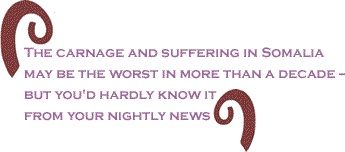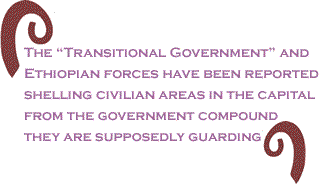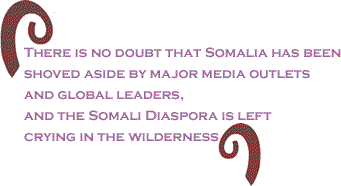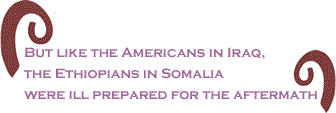Somalia: The Other (Hidden) War for Oil
 Carl Bloice
Carl Bloice
May 5, 2007, 00:46
The U.S. bombing of Somalia took place while the World Social Forum was underway in Kenya and three days before a large anti-war action in Washington, January 27. Nunu Kidane, network coordinator for Priority Africa Network (PAN) was present in Nairobi, and after returning home asked out loud how 'to explain the silence of the US peace movement on Somalia?' Writing in the San Francisco community newspaper Bay View, she suggested one reason I think valid: 'Perhaps US-based organizations don't have the proper analytical framework from which to understand the significance of the Horn of Africa region. Perhaps it is because Somalia is largely seen as a country with no government and in perpetual chaos, with 'fundamental Islamic' forces not deserving of defense against the military attacks by US in search of 'terrorists'.' To that I would add: the major U.S. media's role in the lead up to the invasion and the suffering now taking place in the Horn of Africa. 'The carnage and suffering in Somalia may be the worst in more than a decade -- but you'd hardly know it from your nightly news,' wrote Andrew Cawthorne from Nairobi for Reuters last week. Amy Goodman's Democracy Now recently examined ABC's, NBC's and CBS's coverage of Somalia in the evening newscasts since the invasion. ABC and NBC had not mentioned the war at all. CBS mentioned the war once, dedicating a whole three sentences to it. This, despite the fact that there have been more casualties in this war than in the recent fighting in Lebanon.
While the major U.S. print media has not completely ignored the conflict, its reporting is even shallower than its reporting was prior to the invasion of Iraq. As recently as last week, Reuters was still maintaining that Ethiopian troops had invaded its neighbor with the 'tacit' support of the United States. At least the New York Times has taken to describing it as 'covert American support.' Both characterizations obscure the truth. The attack on Somalia was preplanned and would never have taken place without being approved by the White House. We now know that the Bush Administration gave the Ethiopian government the go ahead to ignore its own imposed ban on weapons purchases from North Korea in order to gear up for the battle ahead. U.S. military forces took part in the assault.
 'US political and military alliance with Ethiopia - which openly violated international law in its aggression towards Somalia, is destabilizing the Horn region and begins a new shift in the way the US plans to have permanent and active military presence in Africa,' wrote Kadane.
'US political and military alliance with Ethiopia - which openly violated international law in its aggression towards Somalia, is destabilizing the Horn region and begins a new shift in the way the US plans to have permanent and active military presence in Africa,' wrote Kadane.
The planning for the invasion actually began last summer when the Union of Islamic Courts (UIC) took control of the Somali government. It, too, was supposed to be a slam dunk. The U.S.- Ethiopian version of shock and awe was to swiftly bring about the desired regime change, installing the Washington-favored,
government- in-exile of President Abdullahi Yusuf. Only a few days after their troops entered the country, Ethiopian officials said their forces lacked the resources to stay in Somalia and they would be leaving soon. At one point, Ethiopian Prime Minister Meles Zenawi declared - Bushlike - that the invaders' mission had been successfully accomplished and two-thirds of his troops were returning home. That turned out not to be true. Three months later the Ethiopians are still in Somalia committing what numerous observers are calling horrendous war crimes.
'The obviously indiscriminate use of heavy artillery in the capital has killed and wounded hundreds of civilians, and forced over 200,000 more to flee for their lives.' Walter Lindner, German Ambassador to Somalia, wrote to the country's acting president last week. Displaced persons are 'at great risk of being subjected to looting, extortion and rape - including by uniformed troops' at a various "checkpoints."
"Cholera - endemic to the region during the rainy season - is beginning to cut a swathe through the displaced,' he continued, adding that attempts by international groups to offer assistance to the victims are being obstructed by militias who are stealing supplies, demanding 'taxes' and threatening relief workers.
On April 3, the Associated Press reported that a senior European Union security official had sent an email to the head of the EU delegation for Somalia warning that 'Ethiopian and Somali military forces there may have committed war crimes and that donor countries could be considered complicit if they do nothing to stop them. I need to advise you that there are strong grounds to believe that the Ethiopian government and the transitional federal government of Somalia and the African Union (peacekeeping) Force Commander, possibly also including the African Union Head of Mission and other African Union officials have, through commission or omission, violated the Rome Statute of the International Criminal Court," the e-mail said.
 In the meantime, the Bush Administration has worked hard to raise troops from nearby cooperative states to take over the job. Promises were made, but with one exception, remain unfulfilled. In a telephone conversation, Ugandan President Yoweri Museveni promised President Bush to provide between 1,000-2,000 troops to protect Somalia's transitional government and train its troops. The Ugandans arrived but are said to have been largely confined to their quarters, refraining from taking part in the effort to crush the opposition. Meanwhile, the 'Transitional Government' and Ethiopian forces have been reported shelling civilian areas in the capital from the government compound they are supposedly guarding.
In the meantime, the Bush Administration has worked hard to raise troops from nearby cooperative states to take over the job. Promises were made, but with one exception, remain unfulfilled. In a telephone conversation, Ugandan President Yoweri Museveni promised President Bush to provide between 1,000-2,000 troops to protect Somalia's transitional government and train its troops. The Ugandans arrived but are said to have been largely confined to their quarters, refraining from taking part in the effort to crush the opposition. Meanwhile, the 'Transitional Government' and Ethiopian forces have been reported shelling civilian areas in the capital from the government compound they are supposedly guarding.
None of the reporters on the scene appear to have explored the question of why the other African governments have failed to send troops but I think the answer is obvious. They would be called 'peacekeepers' but would be called upon to inject themselves into a civil conflict on the side of an unpopular puppet government, something they are loathed to do.
Three months ago, I wrote in this space that 'If the unfolding events in Iraq are any indication, what started out as a swift invasion and occupation could turn out to be a long and widening war.' That was an understatement. As of this writing, about 1,300 people are reported to have perished in the fighting, over 4,300 wounded and nearly 400,000 have fled their homes.
Refugees trying to cross the Red Sea are reported drowning off the Somali coast.
"There is a massive tragedy unfolding in Mogadishu, but from the world's silence, you would think it's Christmas," the head of a Mogadishu political think- tank told Cawthorne. 'Somalis, caught up in Mogadishu's worst violence for 16 years, are painfully aware of their place on the global agenda.'
"Nobody cares about Somalia, even if we die in our millions," Cawthorne was told by Abdirahman Ali, a 29- year-old father- of-two who works as a security guard in Mogadishu.
And, just as in Iraq, the U.S. supported forces - the small army of the enthroned and very unpopular government and the invaders - are caught up in a civil war, set in motion by the invasion and occupation. In addition to the forces loyal to the overthrown Islamist government, the regime in power is opposed by the Hawiye, one of the country's largest clans. A spokesman for the clan recently called upon 'the Somali people, wherever it exists, to unity in the fight against the Ethiopians. The war is not between Ethiopia and our tribe, it is between Ethiopia and all Somali people,' he said.
 "For the major [world] leaders, there is a tremendous embarrassment over Somalia," Michael Weinstein, a US expert on Somalia at Purdue University told Reuters. "They have committed themselves to supporting the interim government -- a government that has no broad legitimacy, a failing government.
"For the major [world] leaders, there is a tremendous embarrassment over Somalia," Michael Weinstein, a US expert on Somalia at Purdue University told Reuters. "They have committed themselves to supporting the interim government -- a government that has no broad legitimacy, a failing government.
This is the heart of the problem. ... But Western leaders can't back out now, so of course they have 100% no interest in bringing global attention to Somalia. There is no doubt that Somalia has been shoved aside by major media outlets and global leaders, and the Somali Diaspora is left crying in the wilderness."
Last week, during what was described as a lull in the fight, Ethiopian soldiers were moving from house to house in the capital Mogadishu, taking hundreds of men away by the truckloads to an uncertain fate. Meanwhile, the traumatized residents of the rubble strewn city were reported gathering up bodies, many of them rotting, for burial. 'Most of the displaced civilians are encamped on Mogadishu's outskirts, where the scenes are medieval,' reported The Economist last week. 'People lack water, food and shelter. Cholera has broken out. The sick sometimes have to pay rent even to sit in the shade of trees. Things will get worse with the rains, which have started. Aid agencies say people will soon start dying in large numbers. Some reckon Somalia is facing its biggest humanitarian crisis, worse than in the early 1990s, when the state collapsed amid famine and slaughter.'
Martin Fletcher wrote in the London Times, April 26, about five days he spent in Mogadishu, during which he canvassed many ordinary Somalis. 'Overwhelmingly, they loathed a government they consider a puppet of the hated Ethiopians.'
Last week the Washington Post reported that interviews it conducted in Ethiopia and testimony given to diplomats and human rights groups, 'paint a picture of a nation that jails its citizens without reason or trial, and tortures many of them -- despite government claims to the contrary.'
'Such cases are especially troubling because the U.S. government, a key Ethiopian ally, has acknowledged interrogating terrorism suspects in Ethiopian prisons, where some detainees were sent after being arrested in connection with Ethiopia's invasion of Somalia in December,' said the Post story. 'There have been no reports that those jailed have been tortured.' The following day, the paper reported, 'More than 200 FBI and CIA agents have set up camp in the Sheraton Hotel here in Ethiopia's capital and have been interrogating dozens of detainees -- including a U.S. citizen -- picked up in Somalia and held without charge and without attorneys in a secret prison somewhere in this city, according to Ethiopian and U.S. officials who say the interrogations are lawful.'
 History will probably record the Ethiopian government's decision to team up with the U.S. Administration for regime change in Somalia as the height of folly. The country has enough problems at home. This was brought into sharp relief April 24, when forces of an ethnic- Somali separatist group, the Ogaden National Liberation Front, raided an oil exploration facility, killing 74 people, including nine employees of a Chinese oil company. 'As Much as China's - and indeed America's - ally Meles Zenawi, the Ethiopian prime minister, might like to be on top of security across the Horn, he is not always able to deliver,' said the Financial Times editorially April 26. 'His army is the region's most powerful conventional force. But under his rule, Ethiopia is fraying again around the edges. Armed separatist groups are now changing tactics. Unable to match the army on the battlefield, the Ogaden National Liberation Front has chosen the spectacular to draw attention to its cause. Only recently, a separatist group in the north tried something similar, by kidnapping a group of British diplomats.'
History will probably record the Ethiopian government's decision to team up with the U.S. Administration for regime change in Somalia as the height of folly. The country has enough problems at home. This was brought into sharp relief April 24, when forces of an ethnic- Somali separatist group, the Ogaden National Liberation Front, raided an oil exploration facility, killing 74 people, including nine employees of a Chinese oil company. 'As Much as China's - and indeed America's - ally Meles Zenawi, the Ethiopian prime minister, might like to be on top of security across the Horn, he is not always able to deliver,' said the Financial Times editorially April 26. 'His army is the region's most powerful conventional force. But under his rule, Ethiopia is fraying again around the edges. Armed separatist groups are now changing tactics. Unable to match the army on the battlefield, the Ogaden National Liberation Front has chosen the spectacular to draw attention to its cause. Only recently, a separatist group in the north tried something similar, by kidnapping a group of British diplomats.'
'Both horrific events can be attributed partly to fallout from Ethiopia's messy intervention in neighboring Somalia,' said the newspaper. 'Initial battles last December were decisively in Ethiopia's favor. But like the Americans in Iraq, the Ethiopians in Somalia were ill prepared for the aftermath. A growing insurgency has delayed the withdrawal of their troops, exposing the government to attacks at home. It has also inflamed tension among ethnic Somalis in Ethiopia, who fight for the ONLF.
'Ironically, the Chinese workers killed near Ethiopia's border with Somalia may have been victims more of Washington's policy in the region than of Beijing's. The US has actively backed Mr. Meles's Somali adventure. In doing so it has undermined multilateral efforts to bring about peace.'
'There are two main questions that Colonel Yusuf's and Ethiopia's western backers should now ask themselves,' said the Guardian April 26. 'What was gained by encouraging the Ethiopian army to topple the Islamic Courts? The US allowed Ethiopia to arm itself with North Korean weapons and also participated in the turkey shoot by using gunships against suspected insurgents hiding in villages near the Kenyan border. Washington was convinced that the Islamic Courts were sheltering foreign terror suspects. But how many did they get and what price have Somalis paid?'
'America can be more heavily criticized for subordinating Somali interests to its own desire to catch a handful of al- Qaeda men who may (or may not) have been hiding in Mogadishu,'said The Economist. 'None has been caught, many innocents have died in air strikes, and anti-American feeling has deepened. Western, especially European, diplomats watching Somalia from Nairobi, the capital of Kenya to the south, have sounded the alarm. Their governments have done little.' Chatham House, a British think tank of the independent Royal Institute of International Affairs, has concluded, "In an uncomfortably familiar pattern, genuine multilateral concern to support the reconstruction and rehabilitation of Somalia has been hijacked by unilateral actions of other international actors -- especially Ethiopia and the United States -- following their own foreign policy agendas.'
 Actually, there is no more reason to believe the Bush Administration promoted this war, in clear violation of international law and the UN Charter, 'to catch a handful of al-Qaeda men,' than that the invasion of Iraq was to eliminate weapons of mass destruction. What has unfolded in over the past three months, flows from much larger strategic calculations in Washington. The invasion and occupation of Somalia coincided with the Pentagon's now operational plan to build a new 'Africa Command to deal with what the Christian Science Monitor dubbed 'Strife, oil, and Al Qaeda.'
Actually, there is no more reason to believe the Bush Administration promoted this war, in clear violation of international law and the UN Charter, 'to catch a handful of al-Qaeda men,' than that the invasion of Iraq was to eliminate weapons of mass destruction. What has unfolded in over the past three months, flows from much larger strategic calculations in Washington. The invasion and occupation of Somalia coincided with the Pentagon's now operational plan to build a new 'Africa Command to deal with what the Christian Science Monitor dubbed 'Strife, oil, and Al Qaeda.'
When I first visited this subject shortly after the invasion, I quoted a 10 percent figure for the proportion of petroleum our country takes in from Africa and noted that some experts were saying the U.S. will need to up that percentage to 25 by 2010. Wrong again. Last week came the news that the U.S. now imports more oil from Africa than the Middle East, with Nigeria, Angola and Algeria providing nearly one-fifth of it -- more than from Saudi Arabia. While the rulers in Addis Ababa claim the invasion was a preemptive attack on a threatening Somalia and the Bush Administration says giving a wink and a nod to the attack was only a chance to capture a few terrorist holed up in Somalia, for most of the media and diplomatic observers outside the U.S. it was another strategic move to secure positioning in the region where there is a lot of oil. On file are plans - put on hold amid continuing conflicts - for nearly two-thirds of Somalia's oil fields to be allocated to the U.S. oil companies Conoco, Amoco, Chevron and Phillips. It was recently reported that the U.S. - backed prime minister of Somalia has proposed enactment of a new oil law to encourage the return of foreign oil companies to the country. Salim Lone, spokesperson for the United Nation mission in Iraq in 2003, now a columnist for The Daily Nation in Kenya, recently told Democracy Now: 'the prime minister's attempt to lure Western oil companies is on a par with his crying wolf about al-Qaeda at every turn. Every time you interview a Somalia official, the first thing you hear is al-Qaeda and terrorists. They're using that. No one believes it. No one believes it at all, because all independent reports say the contrary.'
I spoke with Kidane last week and she allowed that the situation in Somalia might seem complex to many in the peace and social justice movements. However, she said it is impossible to overlook the parallel with the situation in the Iraq. 'It's aggression, that is undeniable, and the same language is being used to justify it,' she said. Kidane is on target in insisting that the movements for peace and justice in the U.S. - and elsewhere - must take up the issue. The unlawful U.S.- Ethiopian invasion and occupation of that country and the accompanying human suffering and human rights abuses constitute a new - and still mostly hidden - war in many ways similar to that in Iraq. And, waged for the same reason.
[BC Editorial Board member Carl Bloice is a writer in San Francisco, a member of the National Coordinating Committee of the Committees of Correspondence for Democracy and Socialism and formerly worked for a healthcare union.]